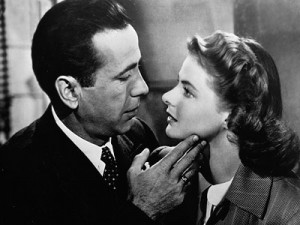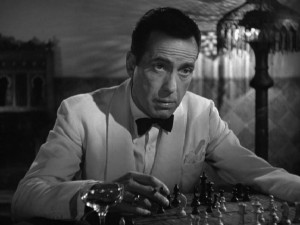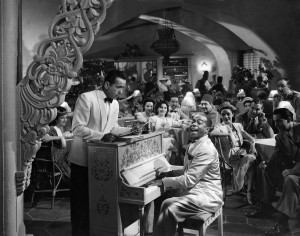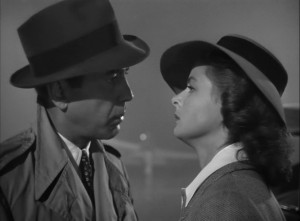 “Casablanca,” the 1943 Best Picture winner, solidified a new kind of screen hero, manifest in Humphrey Bogart’s influential role.
“Casablanca,” the 1943 Best Picture winner, solidified a new kind of screen hero, manifest in Humphrey Bogart’s influential role.
Bogart’s Rick was Hollywood’s first rebel hero. He comes from outside the normal world, and he is a liberating figure. This role is the most innovative thing about “Casablanca.” Rick certainly became one of the most-loved heroes in the history of the movies, because he was the first of his kind. Considering the enduring popularity of this character, Rick was not only the prototype for a new kind of Hollywood hero, but also the prototype for a new kind of American.
However, for being so loved, this character remains an enigma. Rick is nothing and everything. He is another of the film’s dualities. You could even say that he is more or less a prop filling in for a character. He is the classic ambiguous hero. The dichotomy of toughness and tenderness, political commitment and selfishness, is so extreme in this character of Rick that we are left with no clues to discover a real Rick. In “Casablanca”‘s narrative, Rick has grown tired of smuggling and carousing and is now happy enough to more or less retire. As Rick says himself, with ample jadedness, “I stick my neck out for nobody. I’m the only cause I’m interested in.” Thanks to Ingrid Bergman’s miraculous reappearance in his life, though, Rick rediscovers the ideals of his youth.
 Is it too much to say that Bogart’s characterization in this one film is a cornerstone to our culture His performance contains a certain approachable subversive attitude that is now ingrained in society. At the very least, Casablanca is the most important Bogart film, the definitive expression of the Bogart persona.
Is it too much to say that Bogart’s characterization in this one film is a cornerstone to our culture His performance contains a certain approachable subversive attitude that is now ingrained in society. At the very least, Casablanca is the most important Bogart film, the definitive expression of the Bogart persona.
“Casablanca” solidified the Bogie image in general, which now holds such an important position in our cultural heritage. It would be unfair and inaccurate to speak of Bogie’s image without mentioning this crucial role of Rick in “Casablanca.” It would be moreover impossible to imagine Casablanca having the same far-reaching effect that it did, without the contributions of Bogart’s presence.
 The combination of the performances of Bogart and Ingrid Bergman in “Casablanca” should be the very definition of film chemistry. Ingrid Bergman helped create the film’s mystique. James Card writes, “At age twelve I was deeply impressed by Ingrid Bergman, walking towards an airplane on a misty runway, the tears on her face just glimpsed beneath the large hat that shadowed her face.”
The combination of the performances of Bogart and Ingrid Bergman in “Casablanca” should be the very definition of film chemistry. Ingrid Bergman helped create the film’s mystique. James Card writes, “At age twelve I was deeply impressed by Ingrid Bergman, walking towards an airplane on a misty runway, the tears on her face just glimpsed beneath the large hat that shadowed her face.”
Originally Ann Sheridan, Ronald Reagan and Dennis Morgan were signed on to play the respective Bergman, Bogart and Henried roles. This alternate cast looks like a disaster from today’s vantage point. The world would have to have been a noticeably different place today without Bogart as Rick in Casablanca.
“Casablanca” was the crucial cause of the Bogie cult, which reached its apex not in the 1940s or 1950s, but finally in the 1960s. In 1964 at the New Yorker Theater in Manhattan, a co-feature revival of “The Big Sleep” and “To Have and Have Not” broke all house attendance records. Also in 1964, 15,000 viewers attended 42 showings of 14 Bogie movies in Cambridge, Massachusetts at the Brattle Theater. This was the first of ten Harvard University Bogie festivals, all held during exams weeks, which sparked a nationwide trend and the subsequent resurrection of Bogie’s films on television. Time magazine was forced to take notice of this nostalgia movement, confirming that Bogie fever was spreading in the 1960s.
 But what was “Casablanca”‘s effect in the 1960s Or, what did Casablanca have to do with the 1960s “Casablanca” is a fundamental American film. In light of recent history it is important for us to see how the counter-culture movement (which used films like Casablanca as road maps), although attacking the American establishment, was primarily a revolt tied to long-held American beliefs.
But what was “Casablanca”‘s effect in the 1960s Or, what did Casablanca have to do with the 1960s “Casablanca” is a fundamental American film. In light of recent history it is important for us to see how the counter-culture movement (which used films like Casablanca as road maps), although attacking the American establishment, was primarily a revolt tied to long-held American beliefs.
The characters of “Casablanca,” like the young Americans of the 1960s who spear-headed the protest movement, are “real Americans” lost in a unfriendly locale, fighting to open up a new reality. The enduring appeal of “Casablanca,” through the 1960s and up to the present, rests on the melding of various thematic elements: colorful, eccentric characters involved in a riske love story; an exotic, foreign locale; melodramatic political incidents; tough, cynical and humorous repartee; sentimental, idealistic interludes (virtual speeches); heroic, selfless commitment to a cause, etc.
 For instance, the famous, famous line “Play it again, Sam”–just in this small grouping of words, we can see a microcosm of what Casablanca is all about. The film is a meeting point between America’s search for machismo and America’s “kinder, gentler” softness that always looks fondly to the past.
For instance, the famous, famous line “Play it again, Sam”–just in this small grouping of words, we can see a microcosm of what Casablanca is all about. The film is a meeting point between America’s search for machismo and America’s “kinder, gentler” softness that always looks fondly to the past.
And what can we say of Bogart’s final appeal to Ingrid Bergman: “We’ll always have Paris. The problems of three people don’t amount to a hill of beans in this crazy world.” Sentimental words beyond belief, yet delivered with the stiffest of upper lips. Another favorite line was “Round up the usual suspects.” Still another was “Here’s looking at you, kid.” The song “As Time Goes By” also achieved a special place in American culture. The longevity of the film’s popularity can also be traced to its words. People have gone to see “Casablanca” again and again, and will continue to do so, specifically to hear their favorite lines.
“Casablanca” also lives on in the popular press. A 1985 Playboy article entitled “You Must Remember This” imaginatively filled in one of the film’s narrative gaps. A 1987 New Yorker cartoon featured a wife discussing her stern-faced husband with a friend: “Beneath that gruff exterior, he’s a sucker for reruns of ‘Casablanca.'”
Ideology: From Cynicism Back to Idealism
The movie depicts what could be described as an illusion of cynicism, as in the rousingly upbeat end, Bogart’s cynicism is dispelled and idealism restored.
Detailed Plot
American expatriate Rick Blaine is the owner of a nightclub and gambling den in Casablanca during WWII. “Rick’s Café Américain” attracts various nationalities: Vichy French, Italian, and German officials; refugees from Bulgaria (and other countries) trying to reach the still neutral U.S. Though Rick claims to have always been neutral, we later learn that he had run guns to Ethiopia during its war with Italy and fought on the Loyalists side against the fascists in the Spanish Civil War.
The crook Ugarte boasts to Rick of “letters of transit” obtained by murdering two German couriers. The papers allow the bearer to travel freely in German-controlled Europe and to neutral Portugal–as such, they are priceless to the refugees stranded in Casablanca. Ugarte plans to sell them at the club, but he is arrested by the police, headed by Vichy Captain Louis Renault. Ugarte dies in custody without revealing that he had given the letters to Rick.
Ilsa Lund walks into his club and upon spotting Rick’s pianist, Sam, she asks him to play “As Times Goes By.” Rick is angry at Sam for disobeying his order never to perform that song. He is stunned to see his former lover Ilsa, now accompanied by her husband, Victor Laszlo, a Czech Resistance leader. They need the letters to escape to America, where he can continue his work. Meanwhile, German Major Strasser is in Casablanca to prevent Laszlo from leaving.
Ferrari, a major underworld figure and Rick’s friendly business rival, divulges his suspicion that Rick has the letters. In private, Rick refuses to sell at any price, telling Laszlo to ask his wife the reason. They are interrupted when Strasser leads the officers in singing “Die Wacht am Rhein,” whereupon Laszlo orders the band to defiantly play “La Marseillaise.” Laszlo starts singing, alone at first, befoe being joined by the whole crowd, drowning out the Germans. In retaliation, Strasser has Renault close the club.
Later that night, Ilsa confronts Rick in his café, and when he refuses to give her the letters, she threatens him with a gun, but then confesses that she still loves him. She explains that when they first met and fell in love in Paris in 1940, she believed that her husband had been killed trying to escape from a concentration camp. While planning to leave Paris with Rick, she learned that Laszlo was alive and decided to leave Rick without any explanation.
Rick agrees to help, leading Ilsa to believe she will stay with him when Laszlo leaves. Laszlo, aware of Rick’s love for Ilsa, tries to persuade him to use the letters to take her to safety. When the police arrest Laszlo on a minor charge, Rick convinces Renault to release him by promising to set him up for the more serious crime of possession the transit letters.
When Renault tries to arrest Laszlo, Rick forces him at gunpoint to assist in their escape. Rick makes Ilsa board the plane to Lisbon with her husband, telling her she would regret it if she stayed – “Maybe not today, maybe not tomorrow, but soon and for the rest of your life.”
Rick kills Strasser when he tries to intervene. When the police arrive, Renault pauses, then says, “Round up the usual suspects.” Renault suggests to Rick that they join the Free French in Brazzaville. As they walk away into the foggy night, Rick says, “Louis, I think this is the beginning of a beautiful friendship.”











